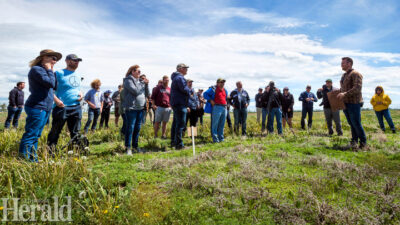Funding cuts create uncertainty for Farming Smarter program
By Tim Kalinowski on June 25, 2021.
 Attendees listen as a session wraps during a past Farming Smarter annual summer Plot Hop east of the city. Herald file photo by Ian Martens
Attendees listen as a session wraps during a past Farming Smarter annual summer Plot Hop east of the city. Herald file photo by Ian MartensLETHBRIDGE HERALDtkalinowski@lethbridgeherald.com
Farming Smarter held its annual summer Field School on Thursday to showcase some of the research it has been undertaking on behalf of local farmers and to provide informational sessions to aid local farm management practices, but, this year, uncertainties around the organization’s future cast a bit of a shadow over the day.
Farming Smarter executive director Ken Coles says with cuts to research funding from Alberta Agriculture, and other funding avenues his organization relies on due to run their course this summer under the old Canadian Agricultural Partnership (CAP) program, he does not know where Farming Smarter will get its funding for next year. Farming Smarter may face budget cuts of up to 30-40 per cent if unsuccessful in securing new research grants, Coles confirms.
“I think we were well established with a number of projects through the previous CAP program,” he says, “but I am concerned about our future with all the changes that have been made toward funding opportunities. And I don’t see a clear path for success for us. So we are busily trying to strategize, and figure out how we are going to continue into the future with the new realities.”
Coles says his hopes for Alberta’s Results Driven Agriculture Research (RDAR) grant, which was supposed to favour farmer-led research initiatives like those undertaken at Farming Smarter, have, so far, not been met.
“I do think RDAR is a great initiative,” he says. “It’s great to have everybody working together. Of course everyone is going to be jockeying for position and to get their slice of the pie, and all that sort of thing, but at this point I just don’t think we have a sufficient (financial) commitment for us to be successful. We receive a $2 million grant among 12 (farmer-led research) groups. That’s the same funding we had 17 years ago. It hasn’t accounted for inflation, our increased capacity, the fact we are having to do more when there is less support out there.
“We always hear how important extension agriculture is, but we rarely see a significant investment in it.”
Coles says the type of research Farming Smarter does may not be the most glamorous, but it is the type of research farmers at field level most value. The fact that Farming Smarter works for farmers and not corporate interests increases the level of trust among producers that the information they are getting from Farming Smarter is more than just an advertisement for the latest product out there.
“I think the impact of what we can do for the entire industry is so much greater than the individual farmers,” he says. “There are always areas that are for the public good which no (corporation) is going to pick up if there isn’t a way to profit from it.
“The return on investment for the type of work we do is huge.”
Coles is hopeful Farming Smarter can obtain federal funding from the Agricultural Climate Solutions Program to open up new areas of research for local farmers starting next year, but there are no guarantees when it comes to any kind of grant funding for the type of extension agriculture his organization does.
“We are trying to do it in a way that still allows us to do some agronomy, and in a way which is beneficial to farmers– and not just on how we sequester carbon,” he says. “Otherwise we are looking at things like fundraising, building our Smart Partner program and our prescription program, and adapting our business to try to be successful as an organization so, in turn, we can help the southern Alberta region and agriculture be successful as well.”
Follow @TimKalHerald on Twitter
4-3




